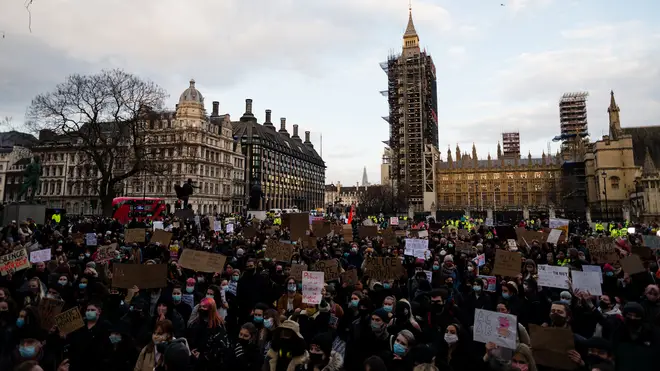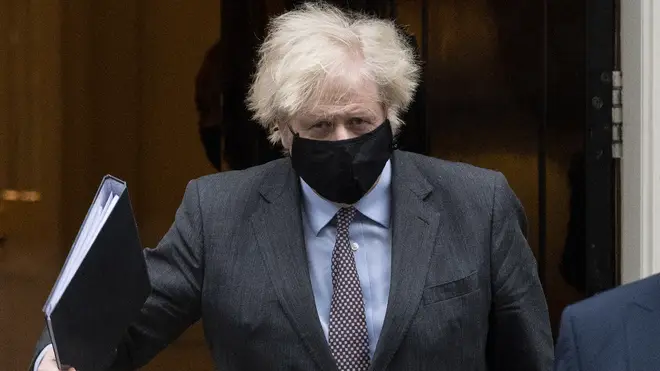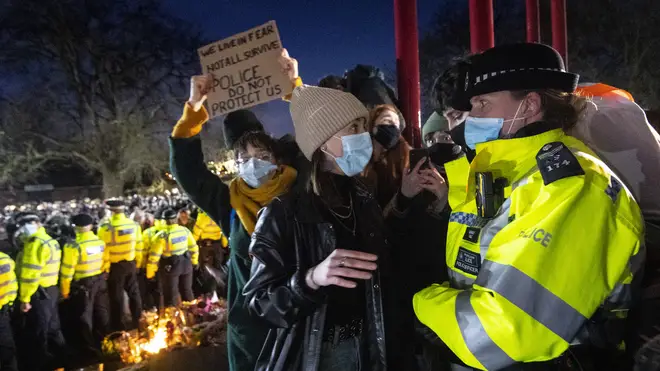
Clive Bull 1am - 4am
16 March 2021, 19:19 | Updated: 16 March 2021, 19:50

A controversial Bill which would bring in curbs on protests has passed its second reading in the House of Commons by 359 votes to 263.
Boris Johnson's controversial Police, Crime, Sentencing and Courts Bill has been described as enough to "make a dictator blush" and show his Government's liking for "authoritarianism", MPs have warned.
Currently laws allow police to place restrictions on a demonstration is they believe it will result in "serious public disorder, serious damage to property or serious disruption to the life of the community".
Read more: Protests allowed from March 29 under Covid rules, Downing Street says
They can also place restrictions on routes.
But under the new Bill, police chiefs will be able to place restrictions on demonstrations which include just one person.
These include allowing police to impose a start and finish time on a protest and impose noise limits.

Hundreds of Reclaim These Streets protesters gather in Parliament Square
The 307-page bill also includes rule changes to “make it easier convict protesters for ignoring conditions placed on a protest” and to stop demonstrations from being held “around Parliament” - which is the heart of British democracy.
It comes as the Metropolitan Police are facing criticism over how they handled a vigil for Sarah Everard on Clapham Common over the weekend.
Serving Metropolitan Police officer Wayne Couzens, 48, has been charged with Sarah's kidnapping and murder.
Read more: PM backs Met chief amid outrage over policing of Sarah Everard vigil
Read more: British public supports Cressida Dick amid fallout from Sarah Everard vigil, poll finds
The gathering was originally planned to be a socially-distanced one with the assistance of police, but after the force pulled support and told people not to attend due to coronavirus rules, people went to pay their respects anyway.
Labour's amendment to block the Bill from being considered further is based on support for some sections - such as tougher sentences for serious crimes including child murder - alongside warnings that it "rushes" changes to protest law and "fails" to take action to protect women.
As part of efforts to overhaul the justice system, the Government has proposed a raft of changes in the Bill.
These include plans to give police in England and Wales more powers to impose conditions on non-violent protests judged to be too noisy and thereby causing "intimidation or harassment" or "serious unease, alarm or distress" to the public.

Time and noise limits could be imposed as a result of the measures in the Bill, and those convicted could face a fine or jail.
Speaking in the Commons, DUP MP Gavin Robinson (Belfast East) said: "I must indicate that I rail against, in the strongest possible terms, the overarching, sweeping and draconian provisions on protest. I have heard Government's position around what they intend.
"The loose and lazy way this legislation is drafted would make a dictator blush. Protests will be noisy, protests will disrupt and no matter how offensive we may find the issue at their heart, the right to protest should be protected."
Labour MP Clive Efford (Eltham) claimed: "We're witnessing a Tory-led coup without guns."
Labour former justice minister Maria Eagle added: "This populist Government has swiftly developed a penchant for authoritarianism."

She said this had emerged from the days of needing to get Parliament to approve vast amounts of Brexit legislation, adding: "The coronavirus crisis has led to a draconian removal of basic liberties, necessary temporarily for health reasons but not for a minute to be thought of as desirable.
"Now the Government wants to make this emergency way of doing things the norm, to enable police officers to have far too much power effectively to silence any protest."
Labour MP Nadia Whittome (Nottingham East) said the proposals marked a "descent into authoritarianism" from the Government and further restrictions on protests were being introduced as Home Secretary Priti Patel "despises" Black Lives Matter and Extinction Rebellion.
Ms Whittome said: "I attended the Black Lives Matter demonstrations in Nottingham East and the protest and vigils at Scotland Yard and Parliament on Sunday and yesterday. We took to the streets because people are angry, we're hurting, we're sick of male violence.
"We are sick of male violence whether it is at the hands of the state, our partners, our family members or strangers. And we march because some people don't survive male violence."
The Bill also proposes expanding the area around Parliament where some protest activities are banned.
Conservative MP Sir David Amess (Southend West) said: "My office looks onto Parliament Square and I have long complained about the endless demonstrations which take place on this very busy roundabout.
"It is absolutely ridiculous. It is very difficult to work because of the noise, with drums, horns and loud speakers.
"Policing these so-called events costs a huge amount of money and Parliament being the seat of democracy, our work should not be disrupted."
The wide-ranging Bill includes plans to bring in tougher sentences for child killers and those who cause death on the roads, longer jail terms for serious violent and sexual offenders, and expand child sex abuse laws to ban religious leaders and sports coaches from having sex with 16 and 17-year-olds in their care.
The Bill could also see the maximum penalty for criminal damage of a memorial increased from three months to 10 years.
Conservative former home secretary Sajid Javid warned the country is "facing an epidemic in child sexual abuse".
Mr Javid said he was particularly pleased the Bill will close a loophole in relation to adults in positions of trust, adding there was a "need to go further".